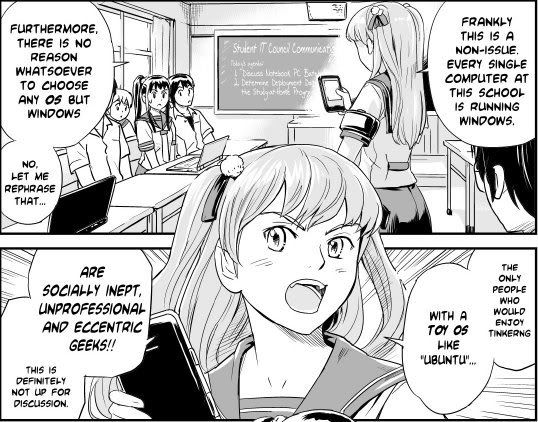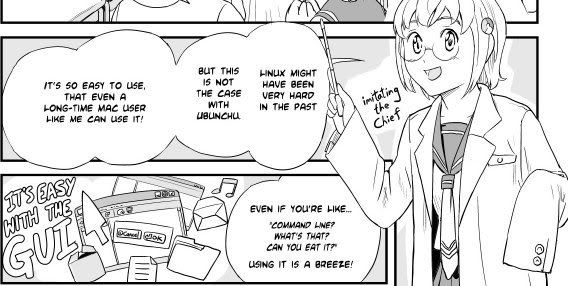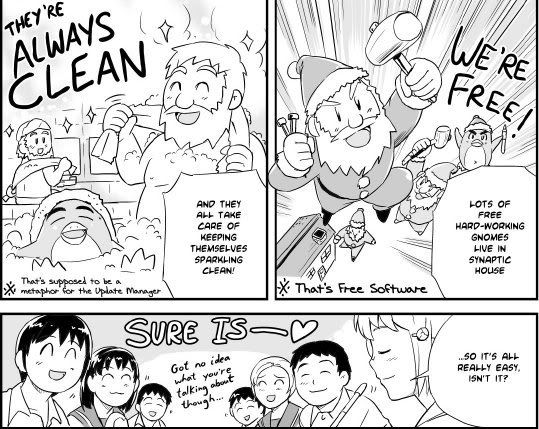So the 5th chapter of Ubunchu, the free manga about the popular free Linux system Ubuntu, is out. Actually it’s been out for a good long while now but you will note that I only fought my way out of quasi-hiatus in the last post.

So I’ll admit it. This manga is starting to feel somewhat direction-less. It’s fine as a documentary sort of thing I suppose, but why not do better eh? Personally I think it’d be great if we could give the Ubuntu/free-software lecture of the weekchapter thing a rest and spend some pages on developing the characters and illustrating the larger setting instead. It’s still fun as a curiousity (and as blogging material), but I hope we’re moving into some actual plot soon because I think Ubunchu is really getting a little hit-and-miss as pure educational material. /rant
So the story goes that a bunch of notebooks are gonna be pushed out to the students for some programme or another and our in-fighting cast from the Sysadmin club had apparently managed to muster enough collective uni-directional will to propose Ubunchu (err, -tu) as the standard OS for the boxes. And on the other side of the ring towers our no-nonsense twin-tailed new character, the president of the computer science club and, you guessed it, championer of Windows. Which Windows though, I wonder?

In order to battle the indomitable twin-tail, the Sysadmin club prepared a Risa-tan lecture as their trump card.
 “Even a long time mac user can use it”? What’s that supposed to imply :D
“Even a long time mac user can use it”? What’s that supposed to imply :D

I have no idea what she was trying to say either. I even looked up the Japanese version to see if it might’ve been a translation-related problem, but apparently it’s just Risa being Risa. For the interested uninitiated though, Synaptic is Ubuntu’s package manager frontend. Software package managers are a very common and powerful feature found in most modern Linux systems. They basically allow you to directly download and install software packages from “software repositories” through the internet. So while the standard way to get software on Windows is to either purchase a CD or to do a Google search for downloadable and hopefully malware-free programs, on Linux you simply open your package manager and look for what you need there. Most Linux distributions maintain such a sheer amount of software in their repositories that you would rarely need to venture anywhere else for software. Best of all, as Risa notes, the vast majority of these software are free and open source, and are guaranteed by the repository maintainers to be malware-free. The result is a clean, safe and convenient system for software acquisition and management – one that has really spoilt me, I might add. I shudder whenever I think of the old days…
As an aside, I wonder sometimes if non-Linux users realize how far you can go living with only free software. I’m not sure I can name 10, or 5 for that matter, pieces of software on my box at the moment that isn’t open source (okay, I guess there’s the Flash browser plugin, and some of the media codecs…). The truth is that in installing a modern Linux desktop you’re actually getting a wide spectrum of open source programs that cover nearly every facet of your computing needs, including all the stuff you’d probably need to pay for on Windows, like video/image editors, complete office suites, programming tools and IDEs, media players, pdf/image viewers, IM messengers, etc etc. Just about *all* of them are open source and community-maintained, because the stuff you usually find on the software store shelf are targeted specifically at commercial systems and don’t install or function on Linux. The only way for Linux to be self sufficient is for its community of users and developers to create and share their own software. And create and share they did. We have come an amazing way today in creating our own free and comprehensive software universe.

An alternative way to translate the original Japanese for twin-tail-chan’s line here could be “Quite frankly, your attempt to leverage your popular moe character as a way of influencing the decision is unacceptable”. Ironic isn’t it, that in real life it is the other camp that is guilty of this :P

Admittedly, this is an interesting thing to do. Again for the uninitiated, as if having a whole bunch of different Linux distributions isn’t enough, you can make remixes of these distributions – basically keeping the underlying infrastructure while customizing everything from the default software set to every portion of the look and feel from boot screen to window decoration. As an example, checkout the Kubuntu-based Hannah Montana Linux. :P
Now that I think about it, I can definitely see how creating a custom remix oriented around a school’s services and needs could help make it an attractive system. At least I could see it being awesome in my school. Imagine having all the configuration and stuff already finished out the box, so we don’t need to beg our technical helpdesk to make guides available and fail. Are you reading this LinuxNUS?

I guess one of the points this chapter was trying to make is software liberty – how free software isn’t just free of charge, but also free in the sense that it is unrestrictive. You will almost never find a free software that would deliberately restrict you from doing something it can do. As an example, remember the software universe I was talking about that has developed around Linux? The truth is a significant portion of that universe is really cross-platform and shareable with non-Linux users – because platform-interoperability is good and it can done. In contrast, software development frameworks and platforms on proprietary systems are often deliberately engineered to be incompatible with competing systems.

Back to the story, we end off with a compromise between the two parties. I’m not sure how much of a compromise it really is though – I mean how many people would actually bother with the rather daunting task of manually installing an OS from CD? Okay, there is Wubi, but still..?
Okay I’ll stop ranting right about here. Have a peek at the final koma and the best evidence of possible twin-tail tsundereness for your troubles.
 Cmon we could use more tsundereness and less Risa-tan lectures!
Cmon we could use more tsundereness and less Risa-tan lectures!

dai1313
It just screams “Dual Boot” to me.
Why settle for one when you can have both?
dai1313
Also, a sysadmin club and a computer science club? Sounds redundant to me.
Jason "moofang"
Heh, true and true :) Actually I’m curious what the computer science club does in its free time, assuming they are not engaged in a permanent civil war like the sysadmin club :P
dai1313
I don’t know, constant war-zone might be amusing.
They probably do a lot of fixing computers that Windows screws up, I do declare.
Jason "moofang"
That or they may be screwing up *other people’s* Windows boxes. Twin-tail chan could in truth be a notorious hacker by night. Would explain her insistence that everyone standardizes on Windows ;)
Actually now that the random thought came I’d actually like that to happen. How bout it Hiroshi Sensei? Would make things a lot more exciting for a change :P
hospital uniforms
We serve the most effective hospitality providers and nursing care to our
patients.
Franda
First of all, I would like to thank you for discussing this topic. It is likely valuable for me, as it provides new ideas and insights for my current project. I am currently gathering as much information as possible on this topic. Very inspiring.
https://info.d2mo0vzloq0ibb.amplifyapp.com